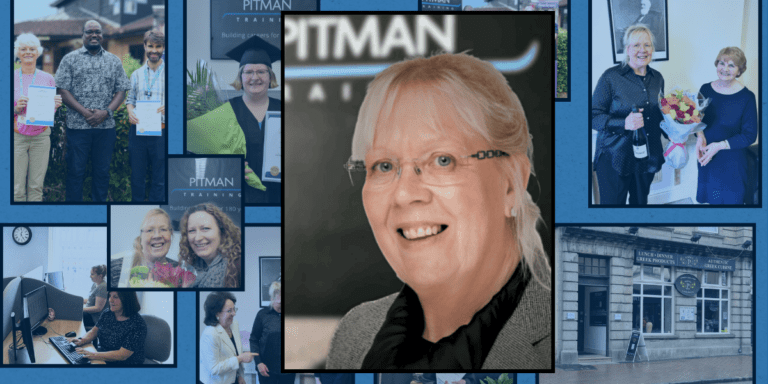To mark National Stress Awareness Day on 1st November Pitman Training and Psychotherapist and Success Coach Catherine Asta Labbett have come together to offer tips and advice on identifying stress triggers alongside suggesting preventative measures that could be used in the workplace, in a bid to reduce the impact stress has on UK workers.
Pitman Training is also sharing tips from Dame Kelly Holmes, a speaker at a recent Pitman Training conference, where she showed support for stress management in the workplace.
As part of celebrating their 180th year, and their continued commitment to supporting the nation in achieving their dreams, Pitman is bringing together this content to encourage people to talk about stress, find ways to prevent stress and together identify better working practices to manage it, to limit the effects it can have on our health, well-being and career success.
Business in the Community* has revealed that work can have a huge impact on our mental health. Almost two thirds (62%) of employees with mental health issues attribute their symptoms to work, or say that it was a contributing factor. And, according to the ONS, 12.7% of all sickness absence days in the UK are related to mental health conditions.
A British Business Superbrand™ having led the way in efficiency and development in the workplace since Sir Isaac Pitman’s invention of shorthand in 1837, Pitman Group M.D Claire Lister is available for interview. She said:
“We all know what it’s like to feel stressed – being under pressure is a normal part of life, but becoming overwhelmed by stress can lead to mental health problems or make existing problems worse and no workplace should put their team members in situations which provoke this – indeed I believe workplaces must work to provide opportunities for staff to identify and address possible stress triggers – it is our responsibility as employers”.
“To mark national stress awareness day at Pitman we are ensuring all our staff have access to a stress awareness pack from Mind and I personally will be emailing all staff inviting them to take an extra coffee break that day, and encouraging them to use that time to plan how they could reduce their daily stresses. This may reveal that as a company we need to get better at certain things, or it may identify personal needs for more training, more support or just a better work life balance”.
“I am keen to spread the message that we shouldn’t dismiss stress as just one of those things that happens; it’s something we should all be aware of, and managing it is key to our health. We are delighted to be sharing tips from Catherine and Dame Kelly Holmes to encourage the nation to take time out to think about preventing stressful scenarios, find ways to prevent stress and identify better working practices and approaches to managing stressful situations. Noticing what’s making us stressed helps us learn how we can deal with it and often in the workplace this can be down to feeling productive, efficient and valued.”
Claire’s top tips are:-
- Organise your time. Time management is a godsend in helping you to feel in control. You can’t control your whole day but if you schedule slots of your day to achieve certain tasks you can take pride in achieving mini goals and not feel so overrun by the overall mountain of work to get through.
- Communicate. If you feel you’re on your own there’s no fun in that. Where possible grab a coffee with your team and share challenges and successes. Use the knowledge and experience around you.
- Ask your boss for a mentor. Striving to achieve more can feel stressful sometimes when you don’t have a barometer to mark your success on. Working with a mentor provides encouragement and a chance to reflect how far you have come.
- Train the brain. The brain is an organ that needs exercising. If we spend too much time carrying out tasks that don’t involve much brain power we become sluggish. Try to continually develop your skills, find new things to learn and fuel your brain with new challenges.
- Encourage the identification of stress symptoms and be open to conversations with team members struggling with these. Things such as lowered productivity (often due to tiredness due to not sleeping), complaints of headaches, absences, irritability and negativity and introverted behaviour can all be signs of stress. Create a process to follow if people need to access support and commit, management down, to help guide colleagues through this. It’s incredibly important to prevent negative attitudes in the workplace that too often surround mental health issues, including stress. Support not criticism is key.
Catherine Asta Labbett is a Psychotherapist and Success Coach, and an ex HR Strategist at the NHS working on their 15 year Workforce Strategy. She is also founder of recently formed Girl Tribe Gang and has been showcased on CNN and BBC Business for her work supporting women in business and helping them battle challenges that could be stopping them achieving their career dreams. She identifies stress as a huge debilitating factor that prevents women from thriving at work.
Catherine is available for interview. She said: “Being under pressure is a normal part of life. It can be a useful drive that helps you take action, feel more energised and get results but there’s a fine line between stress and pressure. There’s no medical definition of stress, and health care professionals often disagree over whether stress is the cause of problems or the result of them. Stress isn’t a psychiatric diagnosis, but it’s closely linked to your mental health. Learning how to deal with stress is imperative as it is one of the main reasons for many of today’s illnesses. Stress can leave us feeling out of control and highly anxious – sustained and prolonged exposure to stress can cause a whole host of physical and emotional symptoms”
Catherine’s top tips are:-
- Get the basics right. Get out for a run, sweat it out, go for a walk, swim, cycle to work, do a lunchtime yoga session. Exercise reduces the body’s stress hormones and triggers the release of endorphins (your body’s natural anti-depressant). Reduce the stimulants i.e. your caffeine and alcohol consumption. Eat a balanced and healthy diet and don’t underestimate the power of a good night’s sleep. Unleash the power of the ‘nap attack’ – it’s self-care in action and napping literally bathes your brain in serotonin, which is the magic stuff that helps improve your mood and sparkle.
- Identify the stressors in your life. Stress can come from all sorts of places. Sometimes life hits us with BIG curveballs that knock us for six, other times it’s a combination of small, but sustained curve balls, which, over time wear us down. Change, increased responsibility, illness, death, divorce, debt, moving house, redundancy, feeling stuck or under sustained pressure and spinning lots of plates are all stress provoking curve balls. Working out what’s contributing to your stress levels is the first part of the jigsaw puzzle. Once you know the stressors it becomes much easier then to work out a plan of attack to reduce them.
- Become a self-care superstar. Taking time out to come up for air is really important. When your mind is full, it’s hard to relax, so have a think about the things that make you feel relaxed and nourished and pop them down on paper. Whether it’s a long hot soak in the bath, binge watching Netflix or reading a trashy magazine – allow yourself to do these things as and when you need to do them (and without the guiLt). Make time to carve out time for you. Time for headspace. Time to think. Time to silence the noise in your head. Time to just be you. It needs to become part of your daily routine.
- We are social beings and feeling isolated can make us feel disconnected. Don’t underestimate the power of conversation and talking. Feeling connected and part of a community/team/organisation can have a massive impact on your emotional health and well-being. Lean in and surround yourself with people who inspire and motivate you.
- Incorporate the art of ‘slow weekending’ which is about recognising that yes, your Monday-Friday is full on, and that actually, what you need more than anything are for your weekends to be at a slower pace. Try switching off your devices, disconnecting from social media and re-connecting with your life. Don’t over plan things. Don’t feel under pressure to have to ‘do things’ and ‘go places’. Discover the art of doing nothing. Create time in your weekend to enjoy cooking and eating a meal, having a work out that might involve an invigorating swim or relaxing spa afterwards. Time with friends to have a coffee and watch the world go by in your favourite café. Savour your time, enjoy the delights that life has to offer and be mindful of your down time and how you are spending it.
Olympic Champion Dame Kelly Holmes first competed at an international level in 1992 and continued to combine being an athlete with my army career before leaving the force in 1995. She has always juggled a lot and it took her from the age of 12 to the age of 34 year to achieve her dream of becoming an Olympic champion and feels that in today’s society the pressure of wanting everything now can increase stress levels of young people. She now works to get young lives on track, through The Dame Kelly Holmes Trust by using world class athletes to empower young people facing disadvantage to realise the attitudes they need to fulfil a positive life.
She said: “In the instant, fast paced world we live in, it is important to understand that seizing our full potential takes time. I always had my eyes set on the goal and for you it’s important to understand what your podium is. I like to test myself and I’m a big multi-tasker and still tend to juggle lots of plates but I also plan meticulously. I realise that some of my goals might take a further 5 years to achieve, but I break them down and work backwards rather than stressing about something I can’t achieve tomorrow”
Kelly’s top tips are:-
- Plan and remember achieving goals takes time. In sport we always had a 4 year plan and targets and worked backwards from these, breaking them down to monthly targets, weekly targets, daily and hourly targets. In life, I still work to the same objectives and targets to define what I need to do each day.
- Be adaptable. This is crucial in life. If things don’t go to plan amend your plan – but always keep your end goal in mind.
- Arm yourself with knowledge. Putting yourself on training is really key – it’s good that we learn from others and learn new things in order to shape ourselves. You need to have the confidence to know you’re doing well. To gain that confidence you need to know what you need to do to get there. What training do you put yourself on? What extra things can you do? Prepare to succeed.
- Know you are good enough. It’s so important from the starting line that you believe in yourself. You know if you’re good enough, it’s not up to others to tell you. I had lots of highs and lows as an athlete. But in 2003, I was suffering from depression to the point of self-harm – that was the lowest of the low. Yes I was an international athlete but I was also a human being. At that point I could have thrown in the towel, but fortunately I knew who I was. I knew my potential and what I was capable of achieving. My goal ‘to be the best I could be’ is what kept me going. Your hard times do not define you – we are all human! Just because we have a bad day – doesn’t mean we are not good!
- Don’t keep your bad days to yourself. I have only just recently started to talk publicly about the emotional struggles I suffered whilst trying to overcome injuries that I thought could end my career. But, I always spoke to my team about my struggles and feel passionately that it’s important to have good people behind you at times like that. I want people to be able to understand that they are not alone and that talking about it is what really helps. There is a lot of pressure on social media to have picture perfect lives and I find that today a lot of people shut the door on their personal reality and put the smile on and pretend it’s all is fine. But if you’re having a bad day people need to know. We all have our teams, and we need to appreciate them (be it at work or family). Our support structure is crucial – without people behind us we can’t be the best we can be, but we also need to remember to believe in ourselves.
Pitman Training is the UK’s most established, franchised training provider, helping the nation transform careers and change lives through self-paced vocational training. Specialists in Office, IT, Administration, Finance and Business skills training, with over 100 centres in the UK, Republic of Ireland and international territories.
Pitman trains around 25,000 individuals each year, achieving an unparalleled completion rate of 98% with an 80% positive job outcome within 6 months of training.
-ends-
Notes to Editor
- Pitman Training is the UK’s most established, franchised training provider, helping the nation transform careers and change lives through self-paced vocational training. Leading the way for growth in development and efficiency within the workplace since Sir Isaac Pitman’s invention of shorthand in 1837. The business has continued to evolve, incorporating modern technologies and advances in order to arm students with the skills they need to get the jobs that they want. Specialists in Office, IT, Administration, Finance and Business skills training, with over 100 centres in the UK, Republic of Ireland and international territories.
For more info on Pitman Training or Catherine please contact Chocolate PR, Call Jo on 0113 2361835, 07910365761, Tweet @chocpr, or email jo@chocolatepr.co.uk
- To follow Dame Kelly Holmes, please use Twitter – @damekellyholmes, or Instagram– reallykellyholmes1500


















